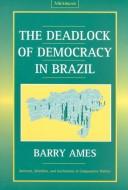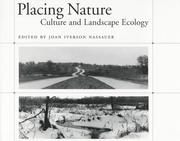| Listing 1 - 10 of 845 | << page >> |
Sort by
|
Book
ISBN: 9789025910419 Year: 2022 Publisher: Utrecht Ten Have
Abstract | Keywords | Export | Availability | Bookmark
 Loading...
Loading...Choose an application
- Reference Manager
- EndNote
- RefWorks (Direct export to RefWorks)
De afgelopen 50 jaar krimpen de noordelijke sneeuwbossen in een rap tempo. Hier worden de geologische effecten van klimaatverandering voor het eerst pijnlijk zichtbaar. Ben Rawlence neemt ons mee langs die cruciale grenslijn – van Noorwegen naar Siberië, van Alaska tot Groenland – en combineert een reisverhaal met journalistiek en wetenschap. Hij portretteert 6 boomsoorten, hun mysterieuze werking op de lucht waar wij afhankelijk van zijn, en schetst een verontrustend toekomstbeeld.
Book
ISBN: 3111593509 3111218732 Year: 1852 Publisher: De Gruyter
Abstract | Keywords | Export | Availability | Bookmark
 Loading...
Loading...Choose an application
- Reference Manager
- EndNote
- RefWorks (Direct export to RefWorks)
To celebrate the 270th anniversary of the De Gruyter publishing house, the company is providing permanent open access to 270 selected treasures from the De Gruyter Book Archive. Titles will be made available to anyone, anywhere at any time that might be interested. The DGBA project seeks to digitize the entire backlist of titles published since 1749 to ensure that future generations have digital access to the high-quality primary sources that De Gruyter has published over the centuries.
Book
ISBN: 9030181311 Year: 2004 Publisher: Groningen Wolters
Abstract | Keywords | Export | Availability | Bookmark
 Loading...
Loading...Choose an application
- Reference Manager
- EndNote
- RefWorks (Direct export to RefWorks)
Atlas --- Wereldkaart --- Aardrijkskunde --- Kaart (geografie) --- Didactics of geography --- geography --- geografie
Book
ISBN: 9789464173178 Year: 2022 Publisher: Berchem Van In
Abstract | Keywords | Export | Availability | Bookmark
 Loading...
Loading...Choose an application
- Reference Manager
- EndNote
- RefWorks (Direct export to RefWorks)
Inclusief blinde kaart van België
Didactics of geography --- geografie --- fysische geografie --- Aardrijkskunde --- Atlas --- Secundair onderwijs

ISBN: 9786612422652 0472021435 1282422650 9780472021437 9780472089048 0472089048 9780472111602 0472111604 6612422653 9781282422650 Year: 2001 Publisher: Ann Arbor
Abstract | Keywords | Export | Availability | Bookmark
 Loading...
Loading...Choose an application
- Reference Manager
- EndNote
- RefWorks (Direct export to RefWorks)
A sophisticated application of rational choice theory
Elections --- Brazil. --- Brazil --- Politics and government --- Brésil --- Politique et gouvernement --- Geografie --- Sociale geografie --- Politieke Geografie.
Periodical
ISSN: 17526868 00221341 Year: 1902 Publisher: [Indiana, PA, etc.] : National Council for Geographic Education,
Abstract | Keywords | Export | Availability | Bookmark
 Loading...
Loading...Choose an application
- Reference Manager
- EndNote
- RefWorks (Direct export to RefWorks)
Geography --- Geografie. --- Study and teaching --- Geography.

ISBN: 1610910990 1417539968 9781417539963 9781610910996 1559635592 9781559635592 Year: 1997 Publisher: Washington, D.C. : Island Press,
Abstract | Keywords | Export | Availability | Bookmark
 Loading...
Loading...Choose an application
- Reference Manager
- EndNote
- RefWorks (Direct export to RefWorks)
Landscape ecology is a widely influential approach to looking at ecological junction at the scale of landscapes, and accepting that human beings powerfully affect landscape pattern and function. It goes beyond investigation of pristine environments to consider ecological questions that are raised by patterns of farming, forestry, towns and cities.Placing Nature is a groundbreaking volume in the field of landscape ecology, the result of collaborative work among experts in ecology, philosophy, art, literature, geography, landscape architecture and history. Contributors consider the goals and strategies needed to bring human-dominated landscapes into intentional relationships with nature, articulating widely varied approaches to the task. Placing Nature provides important insight for those who make such choices - ecologists, ecosystem managers, watershed managers, conservation biologists, land developers, designers, planners - and for all who wish to promote the ecological health of their communities.
Landscape ecology. --- Ecology --- Geografie --- Landschapskunde --- Ecologie.
Multi
ISBN: 9789811627385 9789811627392 9789811627408 9789811627378 Year: 2021 Publisher: Singapore Springer, Imprint: Palgrave Macmillan
Abstract | Keywords | Export | Availability | Bookmark
 Loading...
Loading...Choose an application
- Reference Manager
- EndNote
- RefWorks (Direct export to RefWorks)
"In this theoretically original and empirically very well researched volume, Carlotta Caciagli addresses a main focus in the social science literature on the right to the city: the contentious politics around housing precarity. Developing a spatial approach to urban movements, her ethnographic research singles out the relational dynamics within and around squatted places, studied as educational sites of resistance. A very stimulating reading on a topic that is destined to become all the more central in post-pandemic times." - Donatella Della Porta, Dean of the Faculty of Political and Social Sciences, Director of Centre of Social Movements Studies, Director of the PhD Program in Political Science and Sociology, Scuola Normale Superiore "Carlotta Caciagli has been able to write an impressive volume that makes both empirical and theoretical contributions to how the housing struggles seek to shape contemporary cities. This is a must read for scholars and students interested in urban activism, but it is also a very important work for activists themselves." - Lorenzo Bosi, Associate Professor, Director of Graduate Studies, Faculty of Political and Social Sciences, Scuola Normale Superiore. This book explores contemporary challenges of housing movement organizations, looking specifically at the case of Rome, Italy. The work identifies conditions that allow the re-composition of a class of housing dispossessed and, consequently, the features of its action in urban spaces. The book offers fresh analytical perspectives to understanding contemporary urban transformation via new spatial and strategic approaches. In striking detail, Carlotta Caciagli shows how space is a crucial variable in shaping the strategies that allow for the politicisation of a movement's social base. She illustrates how new spatial configurations of urban space result from unique struggles of the recomposed collective subject. Most notably, three main conceptual tools are introduced to disentangle the relationship between the recomposed precarious class and space: "the spatial opportunity structure", "configurations of strategies" and "educational sites of resistance". Carlotta Caciagli is a Research Fellow in sociology at the department of Urban Studies, Polytechnic of Milan (Italy). She holds a Ph.D. in Political Sciences from the Scuola Normale Superiore, in Florence. Her research interests include social movements, urban transformations, and socio-spatial inequalities. Her research has been published in international journals, such as Antipode, Critical Sociology and others.
Sociology --- Geography --- sociologie --- steden --- geografie --- Social movements.
Multi
ISBN: 9783031226533 9783031226526 9783031226540 9783031226557 Year: 2023 Publisher: Cham Springer International Publishing
Abstract | Keywords | Export | Availability | Bookmark
 Loading...
Loading...Choose an application
- Reference Manager
- EndNote
- RefWorks (Direct export to RefWorks)
This book examines regional structural challenges on Colombia’s path to sustainable social cohesion and regionally inclusive growth. These challenges can be divided into three main groups: (i) those that focus on competitiveness and the supply side, (ii) those that arise from critical business cycle issues on the demand side, and (iii) those concerning environmental sustainability, employment and social inclusion. The contributions, written by experts on Latin American economics and regional science, apply quantitative simulations based on a unified general equilibrium framework and address a wide range of topics, including: Colombia’s competitive integration in global markets, human capital profiles, regional economic disparities and public and private mechanisms of interregional income transfer. The challenges entailed by such high-profile and long-term issues as productivity growth and climate change are also analyzed. In addition, the book positions Colombia’s experiences in an international comparative context. It argues that many other Latin American countries face similar challenges and provide evidence to substantiate this claim. By doing so, it offers valuable policy lessons for Latin American countries with similar difficulties.
Economics --- Economic geography --- economie --- geografie --- Economic history.
Multi
ISBN: 9789811923869 9789811923852 9789811923876 9789811923883 Year: 2022 Publisher: Singapore Springer Nature
Abstract | Keywords | Export | Availability | Bookmark
 Loading...
Loading...Choose an application
- Reference Manager
- EndNote
- RefWorks (Direct export to RefWorks)
This book, based on international collaborative research, presents a state-of-the-art design for "Smart Master Planning" for all metropolises, megacities and meta cities as well as at sub-city zonal and community and neighborhood level. Smart Master Planning accepts that all cities are a smart city in making in a limited way as far as the six components for Smart Cities; namely, smart people, smart economy, smart environment, smart mobility and smart Governance are concerned. Smart Master Planning in any city can only be designed and executed by active roles of Smart People and Smart City Government and is a joint and synchronous effort of E-Democracy, E-Governance and ICT-IOT system in a 24 hour 7-day framework on all activities. In addition to use of Information and Communication Technologies, and Remote Sensing, the design of smart Master Planning utilizes domain specific tools of many aspects of a city to realize the coordinated, effective and efficient planning, management, development and conservation that improve ecological, social, biophysical, psychological and economic well-being in an equitable manner without compromising the sustainability of development ecosystems and stakeholders. This book will present 12 case studies covering more than 12 cities or more cities centered on domain-specific smart planning components. Case studies of Domain Innovations include Urban Land management, Master Planning for Water Management, Comprehensive Master Planning Innovations, Smart Use of Master Plan basics, Integrated Smart Master Planning, and Citizen-Centric Master Planning. .
Computer. Automation --- Geography --- geografie --- algoritmen --- Smart cities.
| Listing 1 - 10 of 845 | << page >> |
Sort by
|

 Search
Search Feedback
Feedback About UniCat
About UniCat  Help
Help News
News